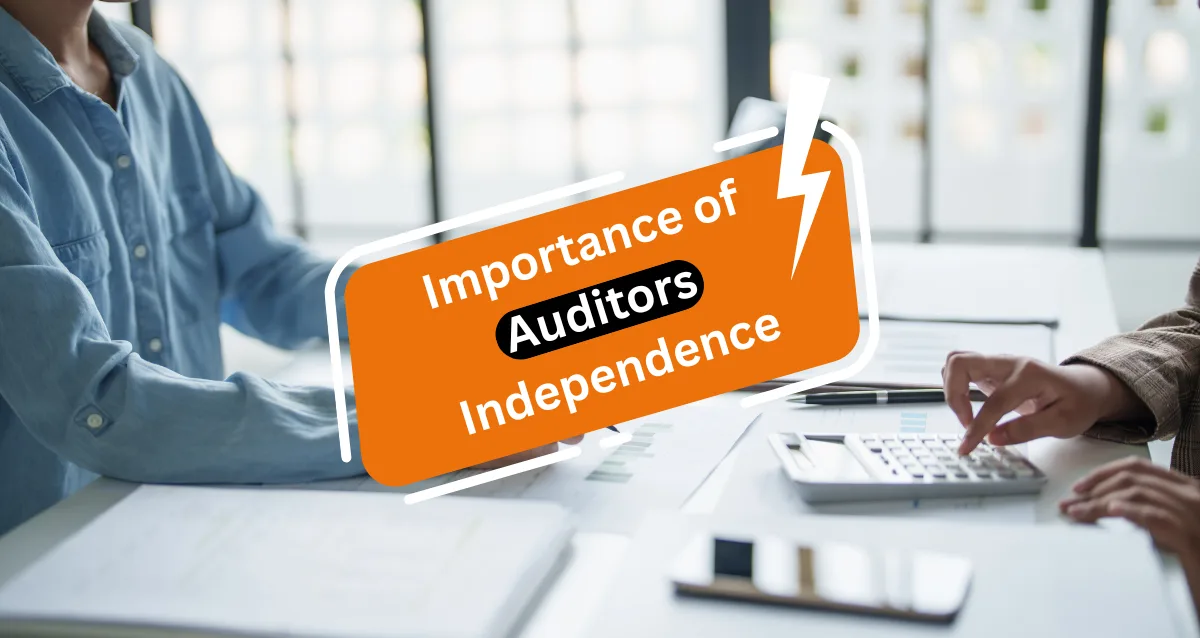Importance of Auditors Independence
Auditor independence is one of the most important concepts in the entire auditing profession. No matter where a company is based, whether in India, the UAE, or any global market, auditors must remain completely free from influence when examining financial statements. Independence is what gives an audit report its value. Without independence, even the most detailed audit loses meaning because no one can trust the results.
For Indian businesses that work with UAE based audit firms, or for companies that operate across both countries, this concept becomes even more important. Financial reports must be credible, transparent, and reliable across borders. Investors, banks, lenders, tax authorities, government departments, and business partners all depend on the auditor to deliver a fair and unbiased view. If independence is missing, the financial ecosystem becomes weak.
This guide explains the meaning of auditor independence in a simple, human focused way. It covers why independence is essential, the biggest threats to auditor independence, including self review threat, advocacy threat, familiarity threat, intimidation threat, and other common challenges faced by auditors. You will also learn how companies can protect the independence of their auditors and why strong governance supports long term business success. Finally, this guide covers how Flyingcolour Tax India supports Indian businesses working in the UAE with transparent, compliant, audit ready operations.
What Auditor Independence Means
Auditor independence means the auditor must perform their work without being influenced by management, personal relationships, financial interests, or any external pressure. Independence is not only about reality but also about perception. This means two things. The auditor must be independent in fact and independent in appearance.
Independent in fact means the auditor makes decisions based on evidence, not emotion or influence. Independent in appearance means outsiders must trust that the auditor does not have any hidden interest. Even the slightest doubt can reduce the value of the entire audit.
This is why independence is not an option but a requirement. For Indian companies working with UAE based auditors, independence ensures that the audit can be accepted by banks, investors, free zone authorities, and international regulators.
Why Auditor Independence Matters
Auditor independence matters because the entire purpose of auditing is to protect the public interest. When auditors remain independent, they help make sure financial statements are truthful. This protects shareholders, employees, investors, lenders, regulators, and society.
Financial statements influence major decisions. Investors decide whether to invest. Banks decide whether to approve loans. Business partners decide whether to enter deals. When auditors are independent, everyone trusts the numbers. When independence is missing, risks appear everywhere.
Independent auditors help reduce fraud, uncover errors, detect poor accounting, and ensure companies follow regulations. For Indian companies operating in the UAE, independent auditors help maintain compliance with UAE laws, Indian laws, and international standards. This builds trust across borders.
Role of an External Auditor
An external auditor is required to be independent when performing an audit. This is because the auditor is expected to give an objective opinion on financial statements. External auditors do not take part in the company’s daily operations. This separation keeps them unbiased.
External auditors examine evidence, verify documents, test transactions, review controls, and check compliance. Their job is to provide an opinion on whether the financial statements show a true and fair view. Independence allows the auditor to challenge management, question unusual transactions, and report any issues without fear or hesitation.
How Auditor Independence Protects Businesses
Independent audits protect companies from financial mistakes, legal penalties, and reputational damage. They also increase investor confidence and support long term stability. Independent auditors help businesses operate ethically, comply with regulations, follow accounting standards, and maintain transparency.
Indian businesses that operate in the UAE depend heavily on independent auditors for visa compliance, banking approvals, tax reviews, free zone renewals, and international investor relations. An independent audit acts as a safety shield.
Five Major Threats to Auditor Independence
Auditor independence faces several threats. These threats can influence the auditor or create the appearance of influence. Understanding these risks helps Indian and UAE based companies build better governance systems.
The key threats include self interest threat, self review threat, advocacy threat, familiarity threat, and intimidation threat.
Self Interest Threat
Self interest threat occurs when the auditor has a personal interest in the client. This could be financial interest, family relationship, close friendship, or dependency on fees.
Common examples include
- A large portion of the auditor’s income comes from one client
- The auditor has investments in the client company
- The auditor has a close personal relationship with management
This creates risk because an auditor may hesitate to report problems for fear of losing the client.
Self Review Threat
Self review threat occurs when auditors review their own work. This happens when an auditor performs accounting services and later audits those same financial statements. It creates a conflict because the auditor may not want to highlight mistakes made earlier.
Example
A UAE based audit firm prepares financial statements for an Indian company and then audits them. This weakens independence.
This is why the same firm should not provide both bookkeeping and auditing for the same client.
Advocacy Threat
Advocacy threat arises when an auditor becomes an advocate or representative for a client. This may involve supporting the client in disputes, promoting their interests, or defending their position.
Examples include
- Representing the client in front of tax authorities
- Marketing the client to investors
- Supporting the client in legal negotiations
An auditor cannot remain neutral while also representing the client. This compromises independence.

Familiarity Threat
Familiarity threat occurs when the auditor becomes too close to the company or its staff. Long term relationships, friendships, or long standing audit engagements can reduce professional skepticism.
Example
Auditing the same company for many years may make the auditor overlook issues.
To prevent this, companies rotate audit partners or firms.
Intimidation Threat
Intimidation threat occurs when the auditor feels pressured. Pressure can come from management, shareholders, or external parties.
Examples include
- Threat of removing the auditor
- Delaying audit fee payments
- Restricting access to documents
- Imposing unrealistic deadlines
Such situations can cause the auditor to avoid reporting problems.
How Companies Can Protect Auditor Independence
Businesses play a major role in maintaining auditor independence. They must ensure no conflict of interest exists. Steps businesses can take include restricting personal relationships, separating accounting and audit services, avoiding unnecessary influence, ensuring timely payment of fees, and creating an environment where transparency is encouraged.
Management must not pressure auditors or try to influence the outcome. Audit committees or independent directors can supervise audit matters.
Impact of Losing Auditor Independence
If independence is lost, the audit cannot be trusted. The financial statements lose credibility. Banks may question loan applications. Investors may lose confidence. Regulators may impose penalties. Shareholders may question governance. The reputation of the company suffers.
For Indian companies with operations in the UAE, losing auditor independence can also impact free zone renewals, visa applications, tax compliance, and banking relationships.
Professional Skepticism as a Key Factor
Independent auditors must maintain professional skepticism. This means thinking critically, questioning assumptions, reviewing evidence carefully, and watching for signs of misstatement. Professional skepticism prevents auditors from accepting information blindly.
Auditor Independence in the UAE and India
Both the UAE and India have strong auditing frameworks. UAE laws require licensed auditors for free zone and mainland companies. Indian businesses that operate in the UAE must follow these rules. Independent documentation, clear accounting records, transparent communication, and clean audit trails are essential.
Responsibilities of Auditors
Auditors must follow ethical codes, maintain objectivity, disclose conflicts, avoid personal relationships, and ensure impartiality. They must examine records, verify evidence, evaluate controls, and report concerns truthfully.
Responsibilities of Management
Management must cooperate fully with auditors. This includes giving access to records, answering questions honestly, maintaining proper books, and avoiding influence over the auditor. Management must also maintain a culture of transparency.
Role of Audit Committees
Audit committees help maintain independence by supervising auditor relationships, reviewing fees, approving engagements, monitoring audit quality, and ensuring transparency. Many Indian companies use audit committees to strengthen governance.
Rotating Auditors to Maintain Independence
Long engagements can weaken independence. This is why companies rotate audit partners or audit firms. Auditor rotation brings a fresh viewpoint and avoids familiarity threats.
How Technology Supports Auditor Independence
Modern auditing software allows auditors to analyze transactions fairly, detect irregularities quickly, and reduce human biases. UAE based audit firms use technology to ensure objective decision making.
Why Auditor Independence Matters for Indian Businesses in the UAE
Indian companies in the UAE must submit audited statements for trade license renewals, banking applications, visa processes, tax filings, investment deals, and financial reporting. If the audit is not independent, authorities may reject the reports.
Independent audits protect Indian entrepreneurs from compliance risks and support international business growth.
How Flyingcolour Tax India Can Help
Flyingcolour® Tax India supports Indian entrepreneurs and companies that operate in the UAE by ensuring that their accounting, documentation, and audit processes remain transparent and audit ready. The team helps companies maintain clear books, prepare accurate financial statements, manage audit coordination, and respond to auditor queries professionally.
Flyingcolour ensures that independence is never compromised. The team separates accounting support from audit coordination and helps clients meet both Indian and UAE requirements. With well managed records and strong compliance practices, businesses avoid penalties and maintain trust with investors, banks, and regulators.
Conclusion
Auditor independence is essential for maintaining trust in financial reporting. It helps protect investors, regulators, employees, and management from risks related to inaccurate or misleading information. For Indian businesses that operate in the UAE, auditor independence is even more critical because it ensures compliance, supports licensing requirements, and builds international reputation.
With guidance from Flyingcolour Tax India, companies can maintain strong internal controls, prepare transparent records, and work with auditors in a way that supports complete independence. This creates long term stability and strong financial credibility for businesses across both India and the UAE.

Frequently Asked Questions
What is auditor independence?
Auditor independence means the auditor must remain free from influence, bias, or pressure while reviewing financial statements.
What are the main threats to auditor independence?
Threats include self interest threat, self review threat, advocacy threat, familiarity threat, and intimidation threat.
Why is auditor independence important?
It ensures transparency, accuracy, and credibility in financial reporting and protects stakeholders from incorrect information.
What is an intimidation threat?
It is a situation where auditors feel pressured by management or external parties, affecting their ability to report honestly.
Why must an external auditor be independent?
An external auditor must be independent to provide a fair and unbiased opinion on the financial statements.
To learn more about Auditor Independence Guide for Indian Businesses, book a free consultation with one of the Flyingcolour team advisors.
Disclaimer: The information provided in this blog is based on our understanding of current tax laws and regulations. It is intended for general informational purposes only and does not constitute professional tax advice, consultation, or representation. The author and publisher are not responsible for any errors or omissions, or for any actions taken based on the information contained in this blog.


